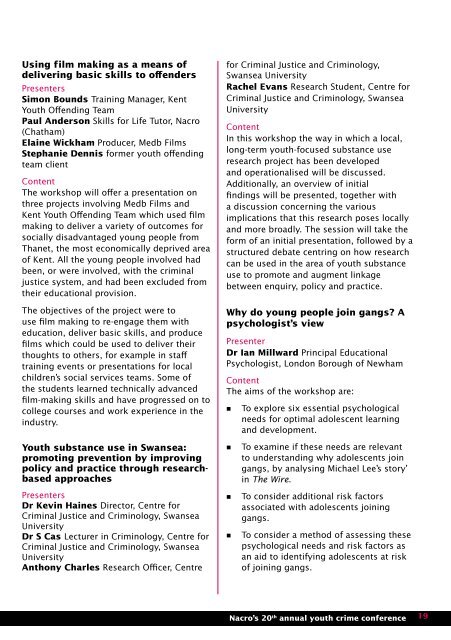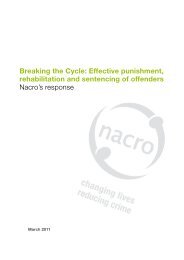Youth justice - Nacro
Youth justice - Nacro
Youth justice - Nacro
Create successful ePaper yourself
Turn your PDF publications into a flip-book with our unique Google optimized e-Paper software.
Using f ilm making as a means of<br />
delivering basic skills to offenders<br />
Presenters<br />
Simon Bounds Training Manager, Kent<br />
<strong>Youth</strong> Offending Team<br />
Paul Anderson Skills for Life Tutor, <strong>Nacro</strong><br />
(Chatham)<br />
Elaine Wickham Producer, Medb Films<br />
Stephanie Dennis former youth offending<br />
team client<br />
Content<br />
The workshop will offer a presentation on<br />
three projects involving Medb Films and<br />
Kent <strong>Youth</strong> Offending Team which used film<br />
making to deliver a variety of outcomes for<br />
socially disadvantaged young people from<br />
Thanet, the most economically deprived area<br />
of Kent. All the young people involved had<br />
been, or were involved, with the criminal<br />
<strong>justice</strong> system, and had been excluded from<br />
their educational provision.<br />
The objectives of the project were to<br />
use film making to re-engage them with<br />
education, deliver basic skills, and produce<br />
films which could be used to deliver their<br />
thoughts to others, for example in staff<br />
training events or presentations for local<br />
children’s social services teams. Some of<br />
the students learned technically advanced<br />
film-making skills and have progressed on to<br />
college courses and work experience in the<br />
industry.<br />
<strong>Youth</strong> substance use in Swansea:<br />
promoting prevention by improving<br />
policy and practice through researchbased<br />
approaches<br />
Presenters<br />
Dr Kevin Haines Director, Centre for<br />
Criminal Justice and Criminology, Swansea<br />
University<br />
Dr S Cas Lecturer in Criminology, Centre for<br />
Criminal Justice and Criminology, Swansea<br />
University<br />
Anthony Charles Research Officer, Centre<br />
for Criminal Justice and Criminology,<br />
Swansea University<br />
Rachel Evans Research Student, Centre for<br />
Criminal Justice and Criminology, Swansea<br />
University<br />
Content<br />
In this workshop the way in which a local,<br />
long-term youth-focused substance use<br />
research project has been developed<br />
and operationalised will be discussed.<br />
Additionally, an overview of initial<br />
findings will be presented, together with<br />
a discussion concerning the various<br />
implications that this research poses locally<br />
and more broadly. The session will take the<br />
form of an initial presentation, followed by a<br />
structured debate centring on how research<br />
can be used in the area of youth substance<br />
use to promote and augment linkage<br />
between enquiry, policy and practice.<br />
Why do young people join gangs A<br />
psychologist’s view<br />
Presenter<br />
Dr Ian Millward Principal Educational<br />
Psychologist, London Borough of Newham<br />
Content<br />
The aims of the workshop are:<br />
• To explore six essential psychological<br />
needs for optimal adolescent learning<br />
and development.<br />
• To examine if these needs are relevant<br />
to understanding why adolescents join<br />
gangs, by analysing Michael Lee’s story’<br />
in The Wire.<br />
• To consider additional risk factors<br />
associated with adolescents joining<br />
gangs.<br />
• To consider a method of assessing these<br />
psychological needs and risk factors as<br />
an aid to identifying adolescents at risk<br />
of joining gangs.<br />
<strong>Nacro</strong>’s 20 th annual youth crime conference 19

















